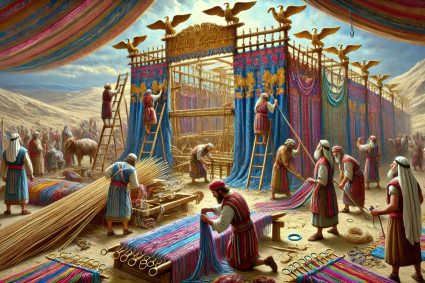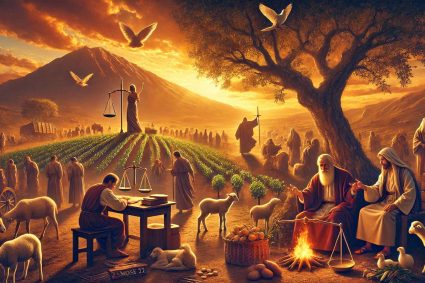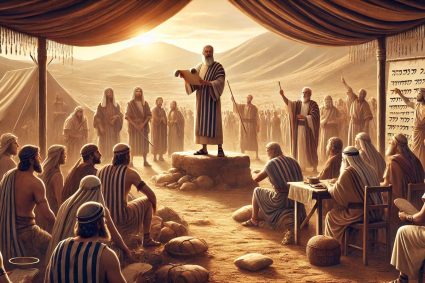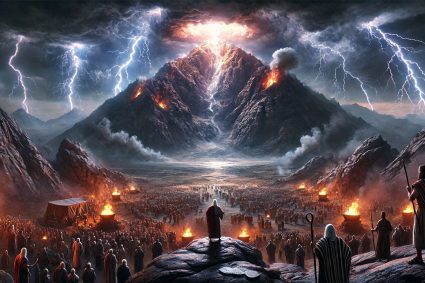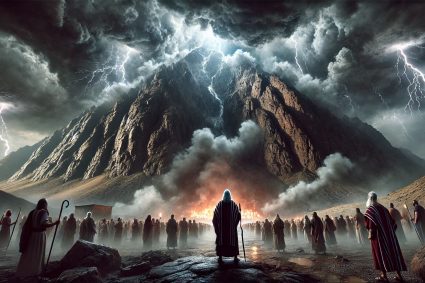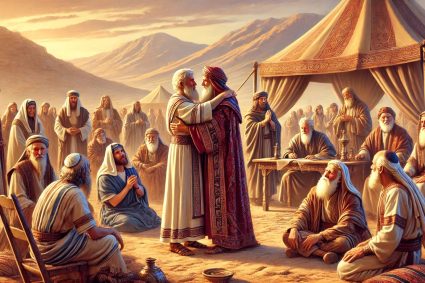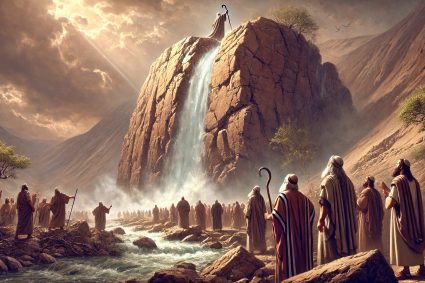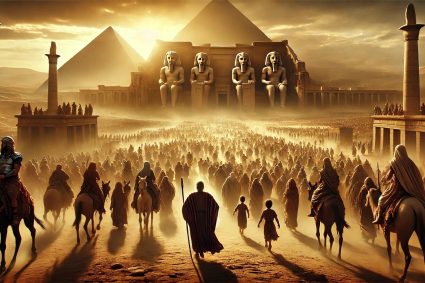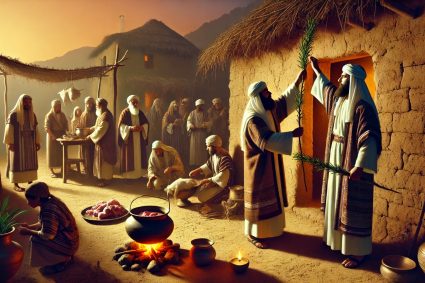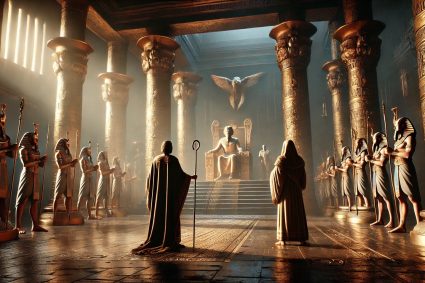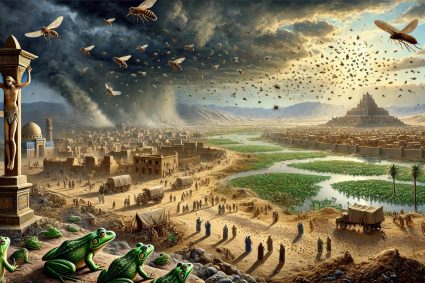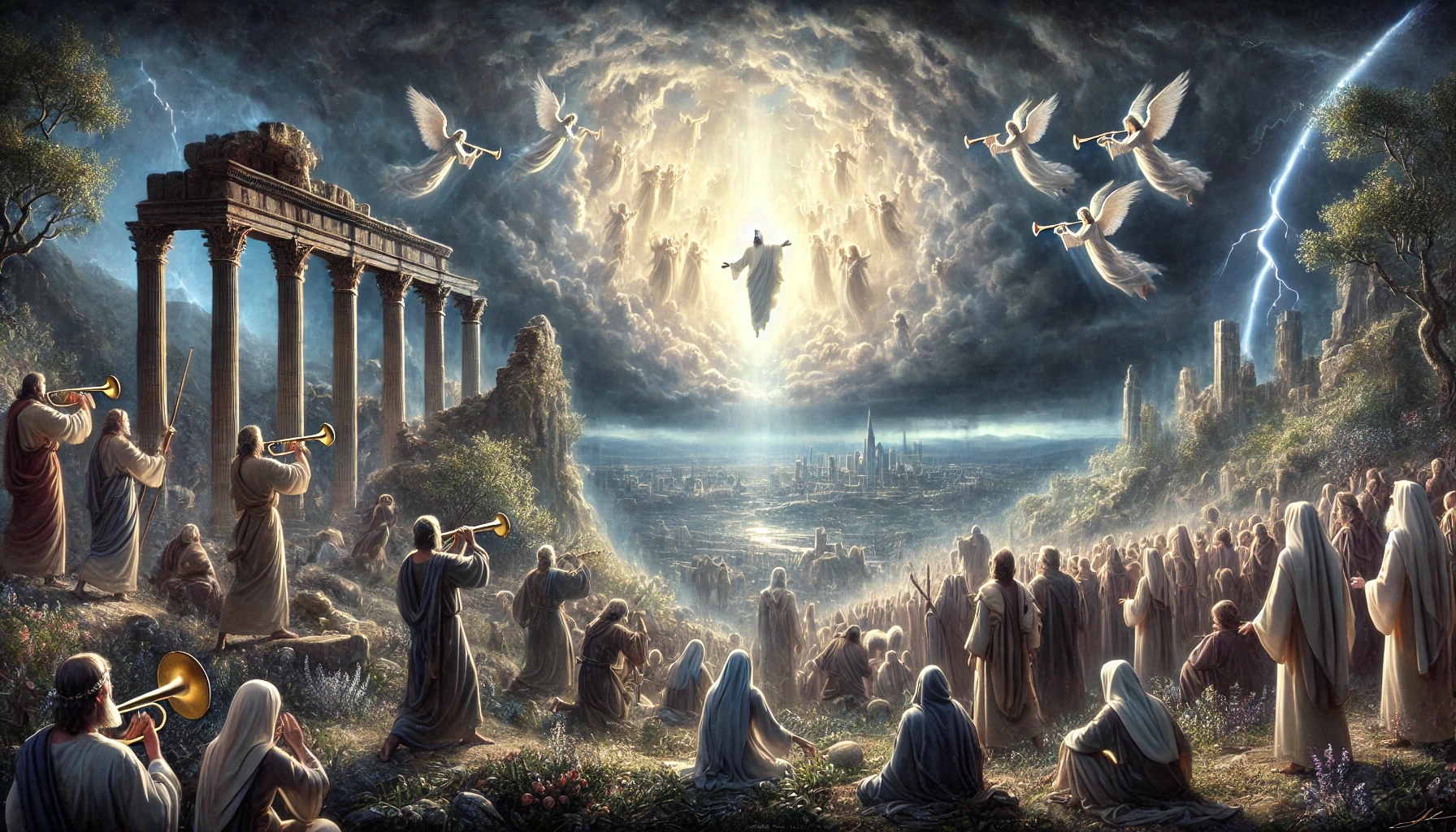
August 23, 2024
DAILY BIBLE READING – Matthew Chapter 24
1 And Jesus went out, and departed from the temple: and his disciples came to him for to shew him the buildings of the temple.
2 And Jesus said unto them, See ye not all these things? verily I say unto you, There shall not be left here one stone upon another, that shall not be thrown down.
3 And as he sat upon the mount of Olives, the disciples came unto him privately, saying, Tell us, when shall these things be? and what shall be the sign of thy coming, and of the end of the world?
4 And Jesus answered and said unto them, Take heed that no man deceive you.
5 For many shall come in my name, saying, I am Christ; and shall deceive many.
6 And ye shall hear of wars and rumours of wars: see that ye be not troubled: for all these things must come to pass, but the end is not yet.
7 For nation shall rise against nation, and kingdom against kingdom: and there shall be famines, and pestilences, and earthquakes, in divers places.
8 All these are the beginning of sorrows.
9 Then shall they deliver you up to be afflicted, and shall kill you: and ye shall be hated of all nations for my name’s sake.
10 And then shall many be offended, and shall betray one another, and shall hate one another.
11 And many false prophets shall rise, and shall deceive many.
12 And because iniquity shall abound, the love of many shall wax cold.
13 But he that shall endure unto the end, the same shall be saved.
14 And this gospel of the kingdom shall be preached in all the world for a witness unto all nations; and then shall the end come.
15 When ye therefore shall see the abomination of desolation, spoken of by Daniel the prophet, stand in the holy place, (whoso readeth, let him understand:)
16 Then let them which be in Judaea flee into the mountains:
17 Let him which is on the housetop not come down to take any thing out of his house:
18 Neither let him which is in the field return back to take his clothes.
19 And woe unto them that are with child, and to them that give suck in those days!
20 But pray ye that your flight be not in the winter, neither on the sabbath day:
21 For then shall be great tribulation, such as was not since the beginning of the world to this time, no, nor ever shall be.
22 And except those days should be shortened, there should no flesh be saved: but for the elect’s sake those days shall be shortened.
23 Then if any man shall say unto you, Lo, here is Christ, or there; believe it not.
24 For there shall arise false Christs, and false prophets, and shall shew great signs and wonders; insomuch that, if it were possible, they shall deceive the very elect.
25 Behold, I have told you before.
26 Wherefore if they shall say unto you, Behold, he is in the desert; go not forth: behold, he is in the secret chambers; believe it not.
27 For as the lightning cometh out of the east, and shineth even unto the west; so shall also the coming of the Son of man be.
28 For wheresoever the carcase is, there will the eagles be gathered together.
29 Immediately after the tribulation of those days shall the sun be darkened, and the moon shall not give her light, and the stars shall fall from heaven, and the powers of the heavens shall be shaken:
30 And then shall appear the sign of the Son of man in heaven: and then shall all the tribes of the earth mourn, and they shall see the Son of man coming in the clouds of heaven with power and great glory.
31 And he shall send his angels with a great sound of a trumpet, and they shall gather together his elect from the four winds, from one end of heaven to the other.
32 Now learn a parable of the fig tree; When his branch is yet tender, and putteth forth leaves, ye know that summer is nigh:
33 So likewise ye, when ye shall see all these things, know that it is near, even at the doors.
34 Verily I say unto you, This generation shall not pass, till all these things be fulfilled.
35 Heaven and earth shall pass away, but my words shall not pass away.
36 But of that day and hour knoweth no man, no, not the angels of heaven, but my Father only.
37 But as the days of Noah were, so shall also the coming of the Son of man be.
38 For as in the days that were before the flood they were eating and drinking, marrying and giving in marriage, until the day that Noe entered into the ark,
39 And knew not until the flood came, and took them all away; so shall also the coming of the Son of man be.
40 Then shall two be in the field; the one shall be taken, and the other left.
41 Two women shall be grinding at the mill; the one shall be taken, and the other left.
42 Watch therefore: for ye know not what hour your Lord doth come.
43 But know this, that if the goodman of the house had known in what watch the thief would come, he would have watched, and would not have suffered his house to be broken up.
44 Therefore be ye also ready: for in such an hour as ye think not the Son of man cometh.
45 Who then is a faithful and wise servant, whom his lord hath made ruler over his household, to give them meat in due season?
46 Blessed is that servant, whom his lord when he cometh shall find so doing.
47 Verily I say unto you, That he shall make him ruler over all his goods.
48 But and if that evil servant shall say in his heart, My lord delayeth his coming;
49 And shall begin to smite his fellowservants, and to eat and drink with the drunken;
50 The lord of that servant shall come in a day when he looketh not for him, and in an hour that he is not aware of,
51 And shall cut him asunder, and appoint him his portion with the hypocrites: there shall be weeping and gnashing of teeth.
King James Version. Public Domain
Commentary
Introduction:
Matthew Chapter 24 is one of the most compelling chapters in the New Testament, where Jesus speaks about the end of times, the coming judgment, and His return. Known as the “Olivet Discourse,” this chapter serves as a prophetic warning and a call to vigilance for His disciples. It begins with the announcement of the temple’s destruction and progresses into a detailed description of the signs that will accompany the end of the world.
Commentary:
The chapter opens with a startling announcement from Jesus that the magnificent temple, the center of Jewish religious life, will be destroyed. This prediction symbolizes not only the end of an era but also the transience of earthly power structures. Disturbed by this statement, the disciples ask Jesus about the signs of the end of the world and His coming.
Jesus then describes a series of events marking the beginning of the “birth pains”: wars, natural disasters, persecutions, and the rise of false prophets. However, these events are merely precursors to the actual end, which will come only after the gospel has been preached to all nations. Jesus emphasizes that these trials will be a time of great distress and trouble, culminating ultimately in His triumphant return.
A particularly significant aspect of this discourse is Jesus’ warning about false Christs and prophets who will attempt to deceive even the elect. He urges His disciples to remain vigilant and describes how His return will be unmistakable and visible to all—like lightning that illuminates the sky.
Jesus uses the image of the fig tree to teach His disciples to interpret the signs of the times. Yet, despite all these signs, the exact timing of His return remains unknown, highlighting the necessity of being prepared at all times. This uncertainty about the end serves as a constant reminder of the need to stay steadfast and alert in faith.
The chapter concludes with the parable of the faithful and unfaithful servant, emphasizing the responsibility of believers to remain faithful while awaiting their Lord’s return. Those who stay vigilant and diligent will be rewarded, while those who are neglectful and unjust will face severe punishment.
Summary:
Matthew 24 is a profound prophecy about the end times, where Jesus warns His disciples of impending trials and calls them to constant vigilance. He describes the signs that will signal the end of the world and stresses the need to be always prepared, as the exact timing of His return is unknown. The chapter serves as a powerful call to all believers to remain faithful and watchful, ensuring their salvation at the end.
![]()

WEEKLY SPIRIT OF PROPHECY READING – Ellen White | The Desire of Ages Chapter 56—Blessing the Children
This chapter is based on Matthew 19:13-15; Mark 10:13-16; Luke 18:15-17.
Read online here
Commentary
The chapter “Blessing the Children” highlights one of the most touching scenes in Jesus’ life, where He demonstrates His special love and affection for the smallest among us. This event is not only an expression of Jesus’ affection for children but also a powerful symbol of the appreciation and place they hold in the kingdom of God.
In the context of the Jewish society of that time, where children were often viewed as the property of their parents rather than as independent individuals with spiritual significance, Jesus’ actions were revolutionary. The disciples, who attempted to dismiss the mothers with their children, likely believed that Jesus’ mission was too important to be interrupted by such seemingly trivial concerns. However, Jesus made it clear that these “trivial” matters are of utmost importance in the kingdom of God. His words, “Let the little children come to me and do not hinder them; for to such belongs the kingdom of God” (Luke 18:16), reflect a profound truth: Children embody the kind of innocence, openness, and trust that adults should also strive for in their faith.
The incident also underscores the far-reaching significance of Jesus’ blessing. The mothers who brought their children to Him did so in hope of divine grace and protection for their little ones. Jesus did not disappoint these expectations. Instead, He blessed the children not only physically but spiritually, providing the mothers with great comfort and hope. This blessing was not just a simple gesture but a profound affirmation that their children are valuable in God’s eyes and that their efforts to raise them in faith are supported and blessed by God Himself.
The commentary also highlights the responsibility of parents to raise their children in the Christian faith. This responsibility is portrayed not merely as a parental duty but as a sacred calling, where parents act as instruments of God. By leading their children to Christ, they help lay the foundation for a life of faith and grace. Parents are to open their children’s hearts to the truths of the Gospel and teach them in ways that are understandable to them. The image of parents as “gardeners,” nurturing the young plants of their children with love and care, is a powerful metaphor that describes the fragility and potential of the child’s soul.
Jesus’ interaction with the children also shows us how we should approach children today. It is a reminder that children should not only be seen as future members of the church but as current, valuable members of God’s community. Their spiritual education begins not only when they reach adulthood but from their earliest years. Therefore, it is the responsibility of parents, teachers, and the entire Christian community to shape these young hearts, encourage them, and guide them to Christ.
Furthermore, it is comforting to see that Jesus’ care and love for children extend beyond that time. The commentary makes it clear that even today, Jesus knows the concerns and struggles of mothers and supports them in their task of raising their children in faith. His love and understanding for the trials and challenges of parenthood are a comforting thought for all who seek support and encouragement in raising their children.
Overall, this chapter provides a profound reflection on the significance of blessing children in the Christian faith and the central role that children play in the kingdom of God. It is a call to all who bear responsibility for children to raise them with love and with an eye towards their spiritual development, and it serves as a reminder that Jesus still holds the same love and affection for the smallest among us today as He did then.

WEEKLY SPIRIT OF PROPHECY READING – Ellen White | The Desire of Ages Chapter 57—“One Thing Thou Lackest”
This chapter is based on Matthew 19:16-22; Mark 10:17-22; Luke 18:18-23.
Read online here
Commentary
This chapter describes the deeply moving encounter between Jesus and a young man known in the Gospels as the rich young ruler. It is a story that speaks not only to the heart but also to the mind, as it addresses central issues of discipleship, obedience, and devotion to God. The encounter reveals the difficulty Jesus presents to the young man: the call to total self-denial and dedication to God in exchange for eternal life.
The rich young ruler symbolizes many people who earnestly seek spiritual fulfillment and the kingdom of God but are held back by the worldly things they hold dear. His desire to gain eternal life is genuine and profound, as evidenced by his urgent approach to Jesus, kneeling before Him, and asking his pressing question. However, when Jesus reveals the true cost of eternal life, the inner struggle of the young man becomes apparent.
Jesus asks him to sell his wealth and give the money to the poor to gain treasure in heaven. This request is not a general rule Jesus sets for all believers but a specific test for this young man. Jesus recognizes that his heart is attached to his possessions and shows him that true discipleship requires letting go of all worldly securities and attachments. It is not merely about relinquishing material wealth but about the willingness to give up anything that keeps the heart from serving God.
The tragedy of this story lies in the young man’s reaction. He is sad because he is not willing to pay the high price Jesus demands. His wealth is too precious to him, and thus he chooses not to follow Jesus. This decision reveals a profound truth: even the best intentions and the most sincere desire for God can be overwhelmed by love for the things of this world.
Jesus’ call to give up everything and follow Him is an invitation to find true freedom in total devotion to God. It is a call that still reaches out today to anyone who seeks eternal life. The story of the rich young ruler shows that the path to God involves the cross of self-denial, and that true fulfillment and eternal life can only be attained if one is willing to leave all earthly things behind.
This incident serves as a reminder that worldly wealth and earthly securities cannot compare with the treasure of heaven. It is a call to reflect on the things that may be hindering us from true discipleship. Whatever our “one thing that we lack” may be, it stands between us and complete communion with God. The rich young ruler had a choice, and that choice also lies before us: Will we be willing to give up everything for Christ, or will we, like him, leave sadly because the worldly things are too important to us?
Jesus’ behavior in this story is also a lesson for all who are engaged in pastoral care. He meets the young man with love and compassion, even though he conveys a harsh truth. His love is not sentimental but demands the truth and the best for the person, even if it means that the path is painful. This approach should also guide those who accompany others on their journey to God.
Ultimately, the story of the rich young ruler shows that following Jesus requires radical decisions. It is a call to total dedication, the renunciation of all idols, and the acceptance of the cross. However, the reward Jesus promises is incomparable: eternal life and the treasure in heaven that far surpasses any earthly joy and security.
(Visited 18 times, 1 visits today)


